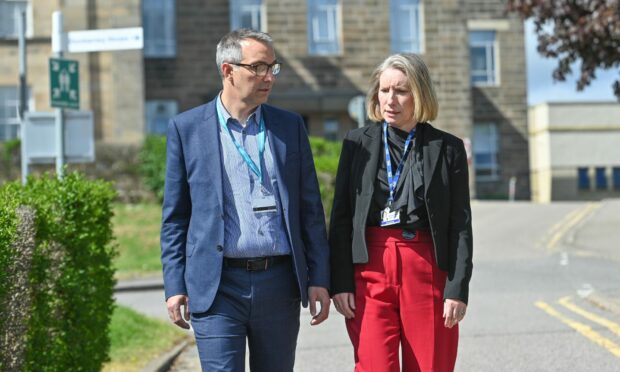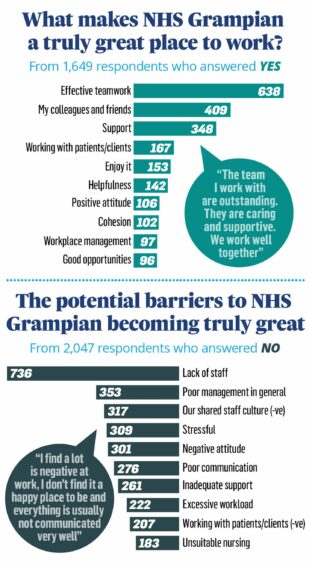An NHS boss has pledged more help for demoralised staff after a new survey has found most are unhappy in their jobs.
More than half of the staff surveyed – 54% – are not happy in their roles with many complaining that the organisation is understaffed.
Staff in the nursing and midwifery and facilities and estates departments were sent the survey in recent months and said they felt stressed with excessive workloads.
They highlighted that there were negative attitudes in the workplace and complained about poor management.
The details of this survey have emerged as NHS Grampian bosses work on plans to improve services for patients over the next decade and help cut down waiting times.
The draft plans will go before NHS Grampian’s board at a meeting in June.
But the workplace survey has revealed management faces huge challenges with the majority of staff highlighting it’s not a great place to work.
Staff feel overworked
In an exclusive interview with The Press and Journal and Evening Express, chief executive Caroline Hiscox admitted that the workforce needed better support.
She said there will be a “crucial commitment” in the plan for the future to support staff working at health services in Grampian.
She said: “They need to be at the heart of all of our plans and ambitions and to have the support and resources they need to thrive and feel safe and well through their work.
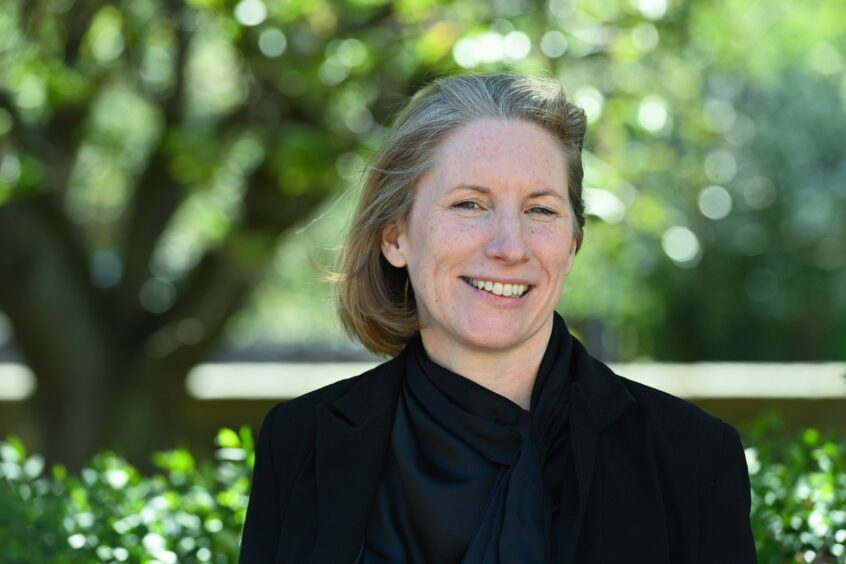
“On one hand, clearly, unless we retain the people we have, no additional recruitment, new facilities or other plans will have the effect they should.
“But, and I also firmly believe, it’s the least we owe them after everything they’ve done, especially over the course of the pandemic.”
What is NHS Grampian’s ‘Plan for the Future’?
The plan will focus on how to design health and social care services for the future, while listening to feedback from people across Grampian.
Bosses have been calling on staff to get involved and provide their honest thoughts in order to map out what the future of the NHS should look like.
Ms Hiscox said: “Across health and social care, the last two years have been extremely punishing.
“It wouldn’t be overstating things to say that it’s been the toughest period in the history of the NHS.
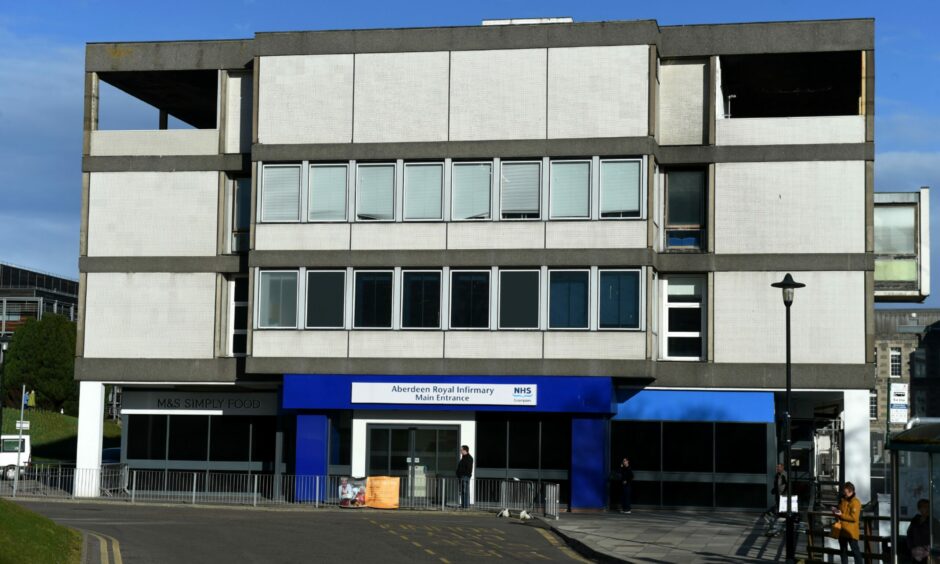
“Like health boards across the country, we face enormous challenges in tackling waiting lists and the ‘health debt’ that’s built up while still improving services, access and embracing innovations.”
The health board said the specific plans will not become public until after the NHS Grampian board has viewed the final draft.
Only 46% of surveyed staff think NHS Grampian is ‘a great place to work’
Just over half of the 9,000 people who were sent the questionnaire filled it in.
The survey revealed 2,074 employees stated that NHS Grampian was not a great place to work with 736 citing this was down to the organisation being understaffed.
And some 350 said it was down to “poor management in general”.
Of the 46% who felt it was a great organisation, 638 said it was because of the “effective teamwork” and 409 said their “colleagues and friends” were the reason why it was a great place to work.
Those working on the ground are best placed to know what changes are needed
The two departments were approached in the first phase of the organisation-wide survey that is being delivered.
NHS Grampian director of people and culture Tom Power said these results are will help them understand where the challenges lie.
He added: “No one knows the issues and the changes required better than those working on the ground.
“That’s why we’ve committed to asking every single one of our colleagues across Grampian for their honest thoughts on what needs to be addressed, what support they need, in more detail than ever before and to do so before the end of this year.”

Mr Power said NHS Grampian had been aware of some of the issues raised since before the pandemic, such as workforce shortages.
Their focus will be placed on attracting, resourcing and recruiting more staff into the organisation.
‘If we’re not listening to uncomfortable feedback – our processes aren’t right’
As part of the survey, Ms Hiscox received more than 2,000 direct messages.
People provided a mixed bag of feedback with some “really positive” comments but other messages were “really uncomfortable”.
She said: “My view of the world is if we’re not listening and hearing uncomfortable feedback, our processes are not right.
“Because, actually, let’s not shy away from the last two years have been the most challenging two years the NHS have ever experienced.
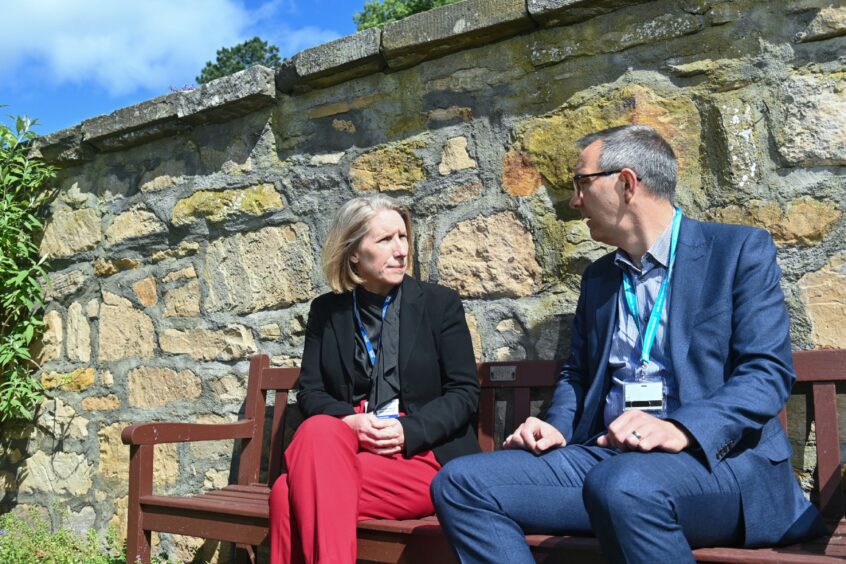
“And we have asked for more from our colleagues than ever before and they have delivered.
“I expected some of the feedback to be uncomfortable.
“Colleagues have been really honest with me. They have really trusted in this process.
“It is now our leadership responsibility to take action.”
More health news…
‘Small price to pay’: Director says latest north-east hospital delay will be worth the wait
These north-east groups are sharing £200,000 – how could it benefit you?
